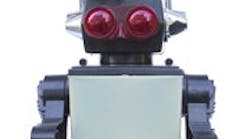By Aaron Hand, Managing Editor
My 9-year-old son has decided he wants to join Boy Scouts next year. I tried to talk him into it a couple years ago because I was aching to build one of those pinewood derby cars and learn how to tie a decent knot. I was never a Boy Scout myself, but what I always pictured was a lot of camping, canoeing and helping old ladies across the street. I couldn't entice him with the pinewood derby, but now he seems pretty keen on the idea of designing and building his own robot.
Boy Scouts of America (BSA, www.scouting.org) this year added Robotics to its list of merit badges its scouts can earn. It will be part of BSA's new curriculum emphasis on science, technology, engineering and math (STEM), which is geared toward teaching scouts the critical skills they really need in today's world (after they've got the campfire set up). The Robotics badge is one of 31 STEM-related merit badges, which could contribute considerably to developing young people who are more interested in pursuing careers in engineering or related fields.
The Robotics merit badge isn't really a departure from the Boy Scouts' usual fare, but rather an ongoing effort to help boys be prepared for life, according to Bob Mazzuca, BSA's chief scout executive. "While the guiding principles of scouting—service to others, leadership, personal achievement, and respect for the outdoors—will never change, we continue to adapt programs to prepare young people for success in all areas of life." Camping may have been an essential survival skill at one time, but science and technology will be essential for our kids' survival in the job market.
BSA developed the Robotics merit badge because of the wide-reaching impact of robotics and the role STEM will continue to play in young people's lives moving forward. The organization pointed to the use of robots in such diverse fields as medicine and manufacturing, law enforcement and search and rescue, and space and underwater exploration. To earn the badge, a scout will have to learn about actuators, sensors and programming, understanding how robots move, how they sense their environment, and how they know what to do.
The Robotics badge is being introduced at a time when more than 200,000 youngsters are already competing each year in robotics competitions through the FIRST (For Inspiration and Recognition of Science and Technology) program, created by inventor Dean Kamen to get kids interested in math and science and inspire them to be science and technology leaders.
My son also is looking forward to fourth grade next year, when he'll finally be allowed to join his elementary school's Lego club, where he will team up with other fourth- and fifth-graders to build a robot for competition. It's part of the FIRST Lego League, an elementary school version of the FIRST Robotics Competition for high schoolers.
Robotics—for many kids, still the stuff of science fiction—can inspire imagination and motivate technical learning. My son isn't attracted to the Lego club because of robotics, but because he's a Lego freak. And he's not interested in Boy Scouts because of robotics, but because he sees how much fun his sister is having this year in Girl Scouts. But through both adventures, he is more likely than ever to explore the science behind building, and will perhaps one day become one of our future generation of technology leaders.
My colleague Jim Montague tells me the Girl Scouts have similar STEM programs to try to develop interest and critical skills among the female set as well. So far, my 9-year-old brownie has been absorbed primarily with crafts and service projects with the rest of her troop.
As I see it, it will be the kids who aren't already clamoring for hands-on scientific knowledge that will benefit the most from programs like FIRST or STEM. The scouts who think they're signing up for camping or crafts but also get a taste of technology might be inspired to eventually fill some of the engineering roles that are in desperate need of new recruits.
At Boys' Life (www.boyslife.org), BSA's monthly magazine, a web page is devoted to asking experts robotics question. The potential of the program is reflected in questions like this one: "What should I study in high school to allow me to work with robots?" With any luck, more kids will be asking such questions and looking to careers in technology.




